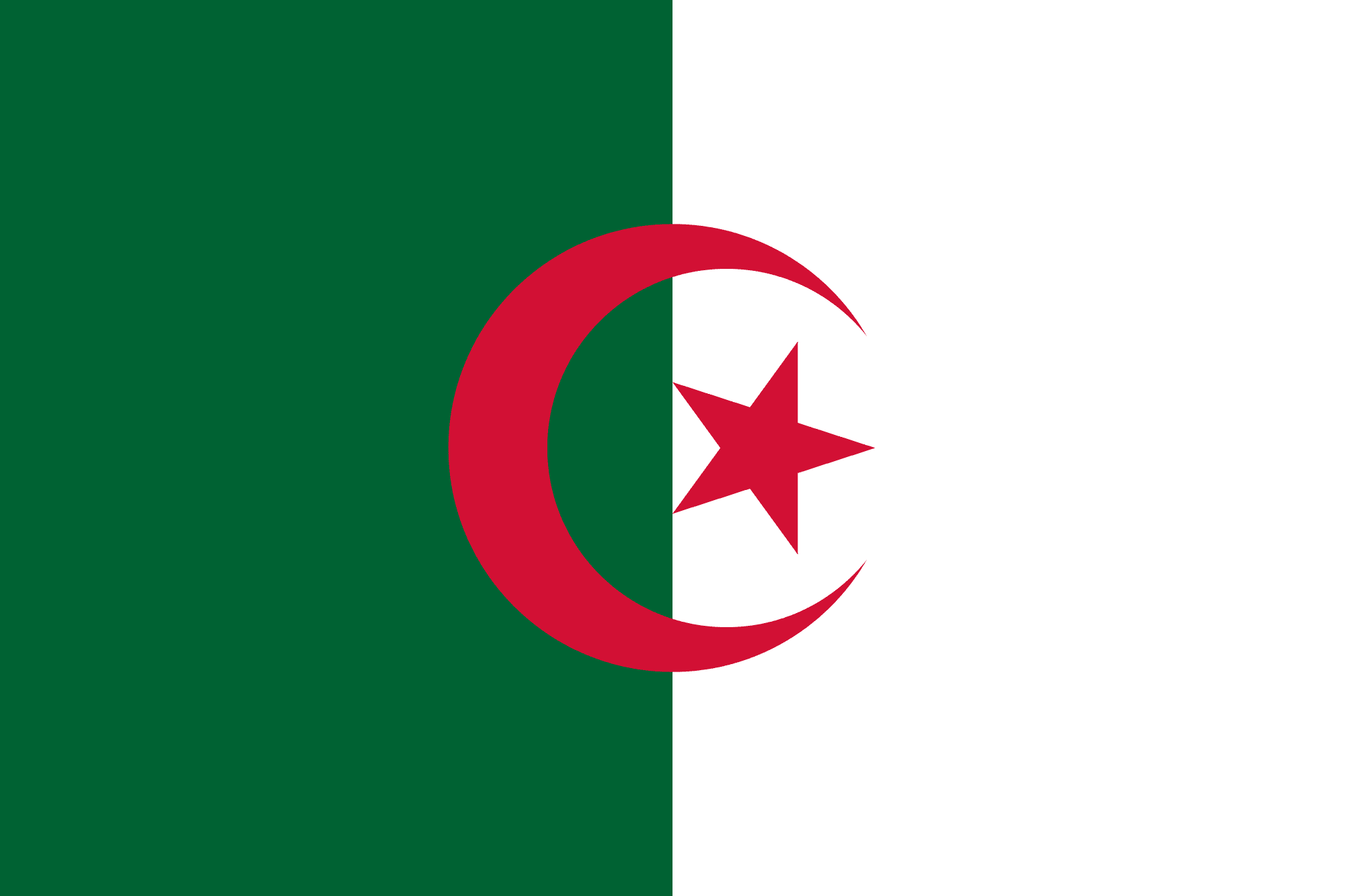
Dec 5, 2013
The autonomous Algerian Trade Union Confederation—the Confédération Générale Autonome des Travailleurs en Algerie (CGATA), or Autonomous General Algerian Workers Confederation—filed a complaint with the International Labor Organization (ILO).
The complaint says the Algerian government’s failure to recognize the union in accordance with the 30-day window as provided for by Algerian law is a violation of the country’s obligations under ILO Convention 87, the Freedom of Association and Protection of the Right to Organize.
The IUF, the global union of food, farm and hotel workers, is hosting an online campaign condemning “acts of intimidation and harassment regularly experienced by independent unionists because of their activities aimed at defending trade union rights in Algeria.”
You can show solidarity with the autonomous Algerian trades’ union movement by sending a message of support through the IUF.
Nov 26, 2013
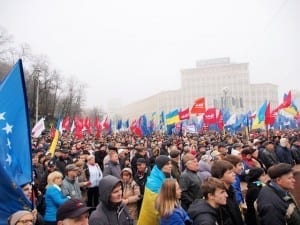
Civil society groups such as independent trade unions support association with the EU but oppose the IMF’s austerity demands.
As protests have spread across Ukraine in recent days over the government’s decision to suspend Association Agreement talks with the European Union, more than 100,000 Ukrainians took to the streets in Kiev on Sunday, marching in the cold rain as part of a coalition of political parties and civil society groups, including the Confederation of Free Trade Unions of Ukraine (KVPU).
After negotiations with the European Union, and a parallel effort by Ukraine to secure loans from the International Monetary Fund (IMF) broke down, the Ukrainian government blamed the collapse of the agreement on the IMF’s push for severe austerity measures. Announcing the end of the negotiations, Ukrainian Prime Minister Mykola Azarov called the IMF’s austerity demands the “last straw.” IMF requirements listed by Ukraine include a wage freeze for public employees and large increases in home utility costs.
KVPU members unanimously adopted a resolution at their November congress calling for the government to sign the EU agreement, but also expressed dismay at the IMF’s austerity demands. KVPU President Mikhailo Volynets said, “We strongly believe that closer ties to the EU will benefit our members. Unfortunately, the IMF demanded economic reforms that would hurt average families in Ukraine, and undercut worker and human rights.
“The problem in Ukraine is not that a teacher or nurse makes 3000 UAH ($365 USD) a month,” Volynets said. “The problem is that a few oligarchs control everything for their own profit and that teachers and nurses only make 3000 UAH a month.”
Volynets urged Ukrainians to keep up the pressure on the government, and also asked for international solidarity.
“The KVPU calls on our European Union friends and the IMF to clearly articulate economic reform proposals that support the average Ukrainian family. We call on the government to sign the Association Agreement without delay. Economic reforms must address the vast income inequality and corruption at the top, and not target average working Ukrainians. Does the IMF want to send the message that austerity at the expense of average Ukrainians was more important, at the end of the day, than democracy?”
Get updates on the ongoing pro-EU integration protests at the English language news site, www.kyivpost.com, and in Ukrainian at the protest organizers Facebook page, www.facebook.com/EuroMaydan.
Follow the action on Twitter with the hashtag, #euromaidan, named after Maidan Nezalezhnosti (Independence Square) in central Kiev.
Nov 25, 2013
A year ago, 112 garment workers were killed in a fire at the Tazreen Fashions Ltd. factory—and a thousand others were injured in the scramble to escape a building with no fire escapes and firmly barred windows.
On April 24, 2012, more than 1,200 garment workers were killed when the multistory Rana Plaza building pancaked in, crushing workers in five factories located in the building.
If these workers, nearly all young women, had been in unions, it’s likely these tragedies could have been prevented.
These disasters—and many more smaller, little-reported workplace tragedies—are why Bangladeshi garment workers are literally organizing for their lives.
Because of the international attention these disasters sparked, workers now can register their unions.
But they are facing intense employer resistance—including physical attacks, threats and termination—and some of these young leaders could benefit from hearing from experienced trade unionists that the fight for a union is worth the struggle.
The workers would be strengthened by international support, knowing they are not alone. To send them a messae of solidarity, please use the sample letter below or write one of your own. Send the completed letter to information@solidaritycenter.org and let these workers know that you stand with them. The Solidarity Center, which has worked for 20 years to help Bangladeshi garment workers gain a voice on the job, will translate and distribute the letter to its union partners, and your message will reach the workers who need to hear it the most.
_____________________________________________________________
SAMPLE LETTER
Dear Sisters and Brothers:
As fellow trade unionists, we are writing in solidarity to commend your bravery and to encourage you to stand together in the face of employer resistance.
Since the tragic Tazreen factory fire in November 2012, you have made great progress in your efforts to organize. Even though ready-made-garment factory owners and the Bangladesh government have placed hurdles and difficulties in your path, you have persevered.
As union members, we know what this struggle is like. We know how hard employers fight to keep the union out, going as far as harassing and firing activists and leaders. Employers will try and turn you against one another.
We know from experience the struggle is worth the difficult journey—the union is the best way for workers to stand up for their rights.
Keep up your amazing effort and find strength in each other. Do not give up! We are with you!
In Solidarity,
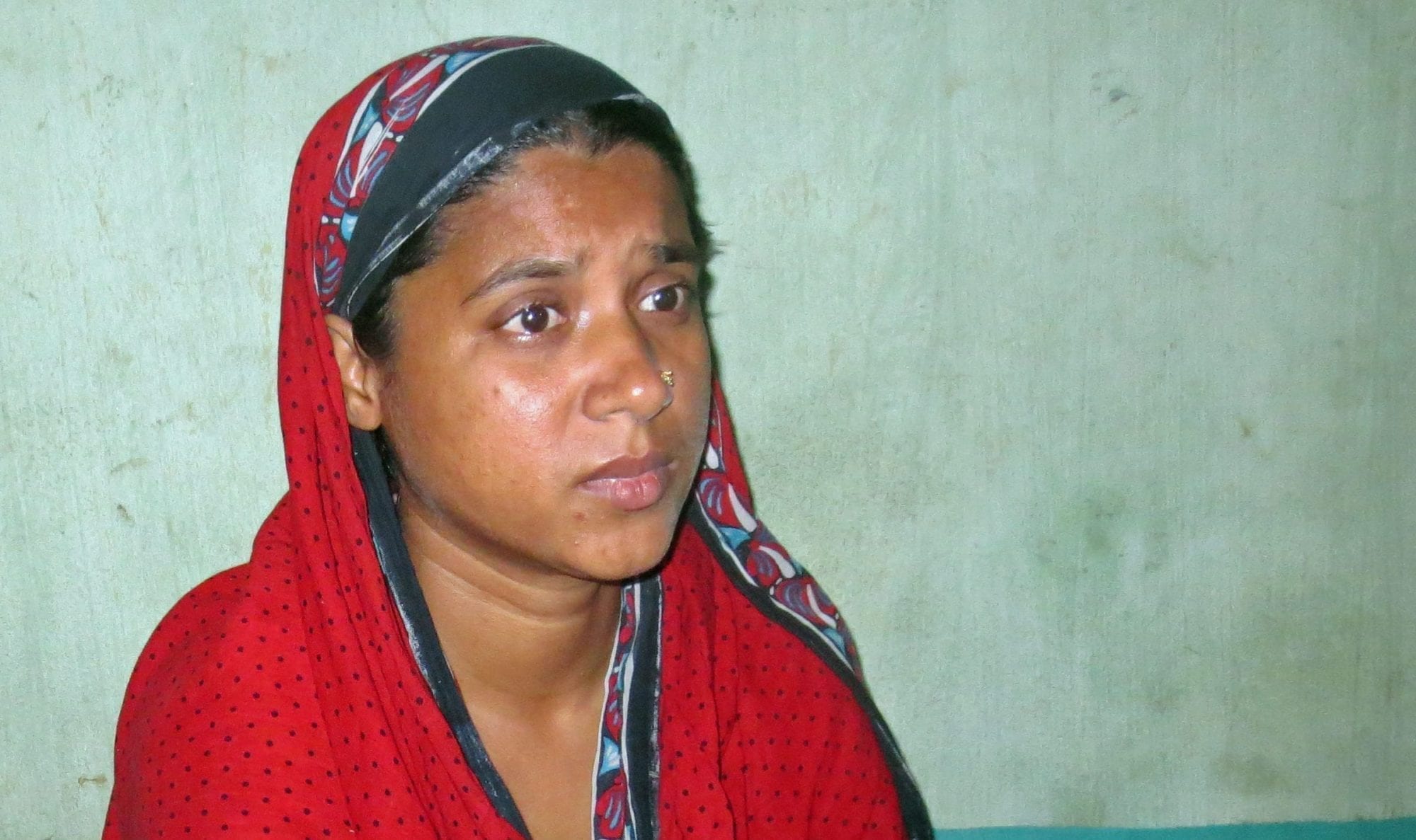
Nov 25, 2013
Tahera, 23, has been so ill from the injuries she sustained in the November 24, 2012, Tazreen Fashions factory fire, her husband Roshidul has had to quit his job to take care of her. Now, they have no income to support their family of four.
The blaze, which spread through the multistory factory outside Dhaka, the Bangladesh capital, killed 112 workers and injured thousands more. Like nearly all Tazreen survivors, Tahera jumped out of a window to escape the flames because the stairwells were locked.
“I have severe pain in my whole body,” Tahera said, crying. “I don’t feel any strength in my body now. Although one year has been passed, I can’t sleep properly because of fear. I try to forget the memory of the Tazreen’s fire accident, but I can’t. Sometimes it seems to me that I will not live any longer.”
Her physical injuries are severe, as are her mental and psychological suffering. As panicked workers broke windows and ripped open air shafts to escape the building, the electricity went out while the blaze spread. Tahera fell in the melee, and her head and chest were trampled.
“Following the fire accident, Tahera behaved abnormally,” says Roshidul. “She used to try to leave the house all the time, even at night. I used to sleep in front of the door of house so that she could not wander out. Following the accident at Rana Plaza, she used to cry loudly watching those scenes on television and, even one year after the accident, whenever my wife watches any scene of fire on television she becomes so scared she cries.” In the Rana Plaza disaster, more than 1,200 garment workers were killed April 24, 2013, after the multistory building housing five garment factories near Dhaka collapsed.
“Even now, I can’t remember any one’s name, sometimes nothing,” Tahera said.
Tahera and her husband are borrowing from shopkeepers to survive and do not know how they will pay rent for their home in Savar, near Dhaka. “Our present financial condition is very poor, which it was not before the accident,” said Tahera. They have a 14-year-old daughter and 2-year-old son, but Tahera says, “I can’t pay the tuition fees of my daughter, I can’t buy milk for my little son and I can’t remember anything.”
Roshidul said nearly all of the money they received for Tahera’s injuries from the Bangladesh Garment Manufacturing and Exporting Association (BGMEA) was spent on her medical care. He also used up his savings for her treatment. Now, there is no money left. “I haven’t been able to take her to the doctor or buy medicine for her treatment for the last two months,” he said. Tahera and her husband say families like theirs have been forgotten.
Tahera came to Dhaka nine years ago, hoping to better her life. Now, all she wants is enough support to get medical treatment and ensure her family has a place to live and food to eat.
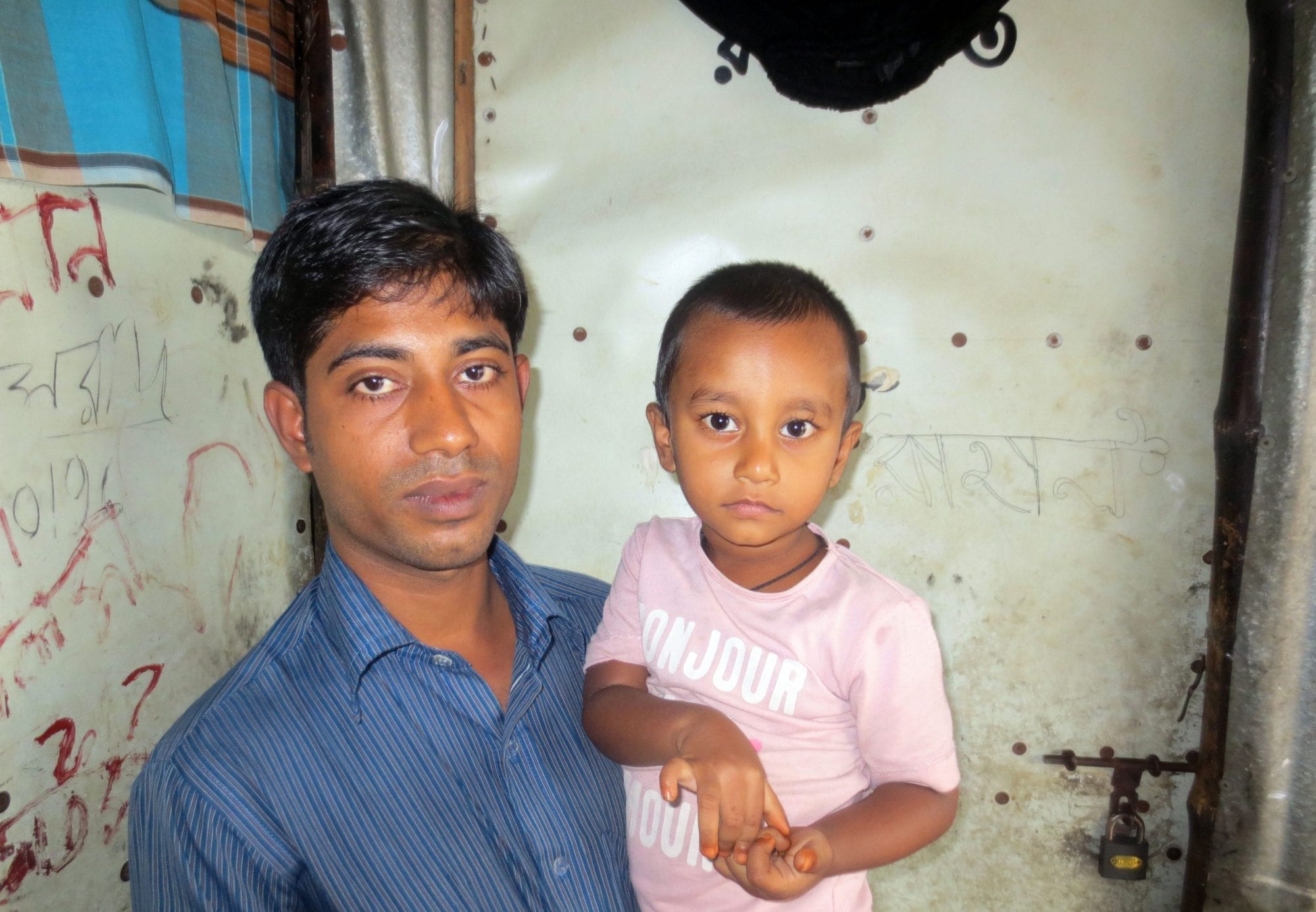
Nov 22, 2013
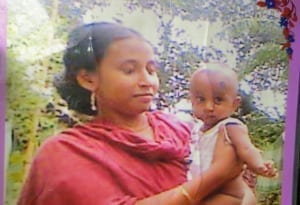
Mahfuza Khatun, 22, died in the Tazreen Fashions factory fire. Photo courtesy Md. Abdul
To mark the one-year anniversary of the deadly Tazreen Fashions factory fire in Bangladesh, the Solidarity Center is highlighting stories of survivors and their families.
Mahfuza Khatun, 22, was a sewing machine operator on the fourth floor of the Tazreen Fashions garment factory when the multistory building went up in flames just outside Dhaka, the Bangladesh capital. Some 112 garment workers were killed in the November 24, 2012, tragedy, and Mahfuza was among them, although her body has never been found.
“I did everything to find her dead body. Unfortunately, all my efforts were in vain,” said Md. Abdul, Mahfuza’s husband.
Abdul and his 2-year-old son live with his parents and Abdul’s three siblings. As the eldest son, he must provide nearly all the financial support for his extended family.
“The family used to be supported by the income of me and my wife,” said Abdul, also a garment worker. Now, his income alone cannot cover all the family’s costs. As a result, he said, “My son often becomes sick, and I cannot take him to the doctor for lack of money.”
Mahfuza came to Dhaka in 2009 with her husband. “Despite her desire to continue to study, she started working to financially support my family. Until the last day of her job, she never spent a single penny outside of this family,” he said.
“On November 24, 2012, it was lunch time when I talked to her for the last time. In the evening, I heard about the fire at Tazreen Fashions and rushed to see my wife. I looked for my beloved wife in every nook and corner but could not find a trace of her.” His sister-in-law also was burned to death at Tazreen. Workers who escaped the blaze did so by jumping out windows because nearly all the stairwell doors were locked.
Neither Abdul nor his son have received any compensation on behalf of Mahfuza—with the exception of $25.64 he got from the Bangladesh Garment Manufacturers and Exporters Association. He spent nearly all his savings looking for her body. Property he owned near Tazreen was destroyed in the blaze and now, Abdul says, “I do not have anything for the future of my son.”
Survivors and the families of those injured or killed are still suffering a year after the Tazreen blaze, and no one has stepped up to help them survive the devastating financial and emotional loss. “I urge the government to behave responsibly and arrange security for every single citizen,” Abdul said. He seeks “enough compensation from BGMEA and the factory owner so that I can survive and educate my son.”
Survival is one of many struggles Abdul faces. “What will I say when my son asks about his mother?” he asked. “I will not even be able to show her grave to her son.”





